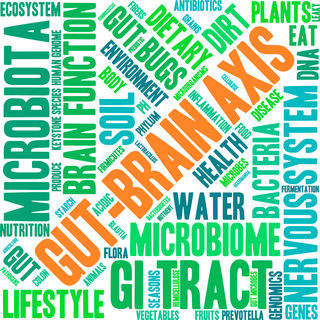Aging
Study Links Gut Microbiome With "Ridiculously Healthy" Aging
People who live to be 100 years old have distinctive gut microbiome ecosystems.
Posted October 12, 2017

"Ridiculously healthy" aging is correlated with a healthy gut, according to one of the largest human microbiota studies to date. This trailblazing study was conducted by the newly formed China-Canada Institute, which is a collaboration of researchers from Western University, Lawson Health Research Institute, and Tianyi Health Science Institute in China. Their latest study, "The Gut Microbiota of Healthy Aged Chinese Is Similar to That of the Healthy Young," was published this month in the journal mSphere.
Participants in this study consisted of over 1,000 adults living in China who ranged in age from three years old to over 100 years old. The entire cohort was purposely selected to be extraordinarily healthy as marked by no known medical concerns or any significant history of family disease. After extensive data analysis, the researchers were able to show that the gut microbiota ecosystems of exceedingly healthy centenarians were similar in diverse composition to the gut microbiota colonies observed in healthy 30-year-olds.
In a statement, co-author Gregor Reid, who is a professor at Western University and a scientist at Lawson Health Research Institute, described the purpose of this study: "The aim is to bring novel microbiome diagnostic systems to populations, then use food and probiotics to try and improve biomarkers of health. It begs the question—if you can stay active and eat well, will you age better, or is healthy aging predicated by the bacteria in your gut?" This is a classic example of the chicken-or-the-egg conundrum.

Each of us has trillions of microorganisms and a unique profile of bacterial colonies—commonly referred to as "microbiome" or "microbiota" interchangeably—residing in our gastrointestinal tract at any given time. Microbiota creates a dynamic ecosystem that is a combination of both beneficial “good bacteria” and potentially detrimental bacteria. Microbiome colonies begin to reside within our intestines immediately after birth and are vital to a broad range of neurobiological, physiological, and immunological functions at every age.
Scientists don't know the cause and effect of gut microbiota and healthy aging.
"The main conclusion is that if you are ridiculously healthy and 90 years old, your gut microbiota is not that different from a healthy 30-year-old in the same population," Greg Gloor, the principal investigator of this study, said in a statement. Adding, "Whether this is cause or effect is unknown."
Although there have been countless animal studies on gut microbiome, human research in this field is still in its earliest stages. And, all of the human research to date has been "cross-sectional" meaning that it just takes a snapshot of one moment in time as opposed to a longitudinal study which follows participants for many years. Thus, all of the findings on gut microbiome in humans are still correlative. Because correlation does not mean causation, it's important to note that identifying a link between a healthy gut and healthy aging is only a preliminary step towards truly understanding what specific factors are causing this correlation.
Due to the preliminary nature of this research, it's way too early to draw any firm conclusions about specific lifestyle habits, dietary choices, or supplements that might result in optimal changes to human gut microbiome ecosystems. Yes, experts have made some educated guesses about what factors may improve our gut microbiome... Nevertheless, please use common sense and be extremely cautious when making any radical changes to your diet or consuming synthesized probiotics based on media hype or profit-driven marketing campaigns.
In concentrated pill form, many of the "microbiome" or "microbiota" enhancing supplements on the market could actually be bad for your health or just a waste of money. Unfortunately, research findings such as the latest by Gloor et al. often lead to 'snake-oil salesmen' coming out of the woodwork and making dubious claims about some magical new 'pill, powder, or potion' they've invented that contains ingredients that will give you the perfect gut microbiome ecosystem.
Please: Don't gullibly believe all the microbiome hype! Scientists still do not understand gut microbiota well enough to create products that are guaranteed to universally optimize microbiome ecosystems across a lifespan.
That said, one game-changing aspect of the latest study from the China-Canada Institute is that it has created a baseline profile of what healthy gut microbiome profiles look like across the human lifespan for the first time. In a significance statement, the authors sum up the importance of their findings:
"We report the large-scale use of compositional data analysis to establish a baseline microbiota composition in an extremely healthy cohort of the Chinese population. This baseline will serve for comparison for future cohorts with chronic or acute disease. In addition to the expected difference in the microbiota of children and adults, we found that the microbiota of the elderly in this population was similar in almost all respects to that of healthy people in the same population who are scores of years younger. We speculate that this similarity is a consequence of an active healthy lifestyle and diet, although cause and effect cannot be ascribed in this (or any other) cross-sectional design."
The authors reiterate the specificity and correlative nature of their findings again in the paper's conclusion: "The results suggest that if you live to be 100 and in perfect health in China, your microbiota will likely appear to be relatively similar to that from a person in their mid-30s. Whether this is cause or effect is unknown, but it suggests that resetting an elderly microbiota to that of a 30-year-old might help promote health if the microbiota is outside the norm."
The China-Canada Institute team is optimistic that by studying the gut microbiome ecosystems of "ridiculously healthy" people at various stages of life that someday they'll be able to fine-tune targeted interventions that can optimize gut microbiome profiles for people at various ages who are prone to getting sick. Stay tuned!
References
Bian, Gaorui, Gregory B. Gloor, Aihua Gong, Changsheng Jia, Wei Zhang, Jun Hu, Hong Zhang, Jeremy P. Burton, Gregor Reid, Yongliang Xiao, Qiang Zeng, Kaiping Yang, Jiangang Li. "The Gut Microbiota of Healthy Aged Chinese Is Similar to That of the Healthy Young." mSphere (2017) DOI: 10.1128/mSphere.00327-17




